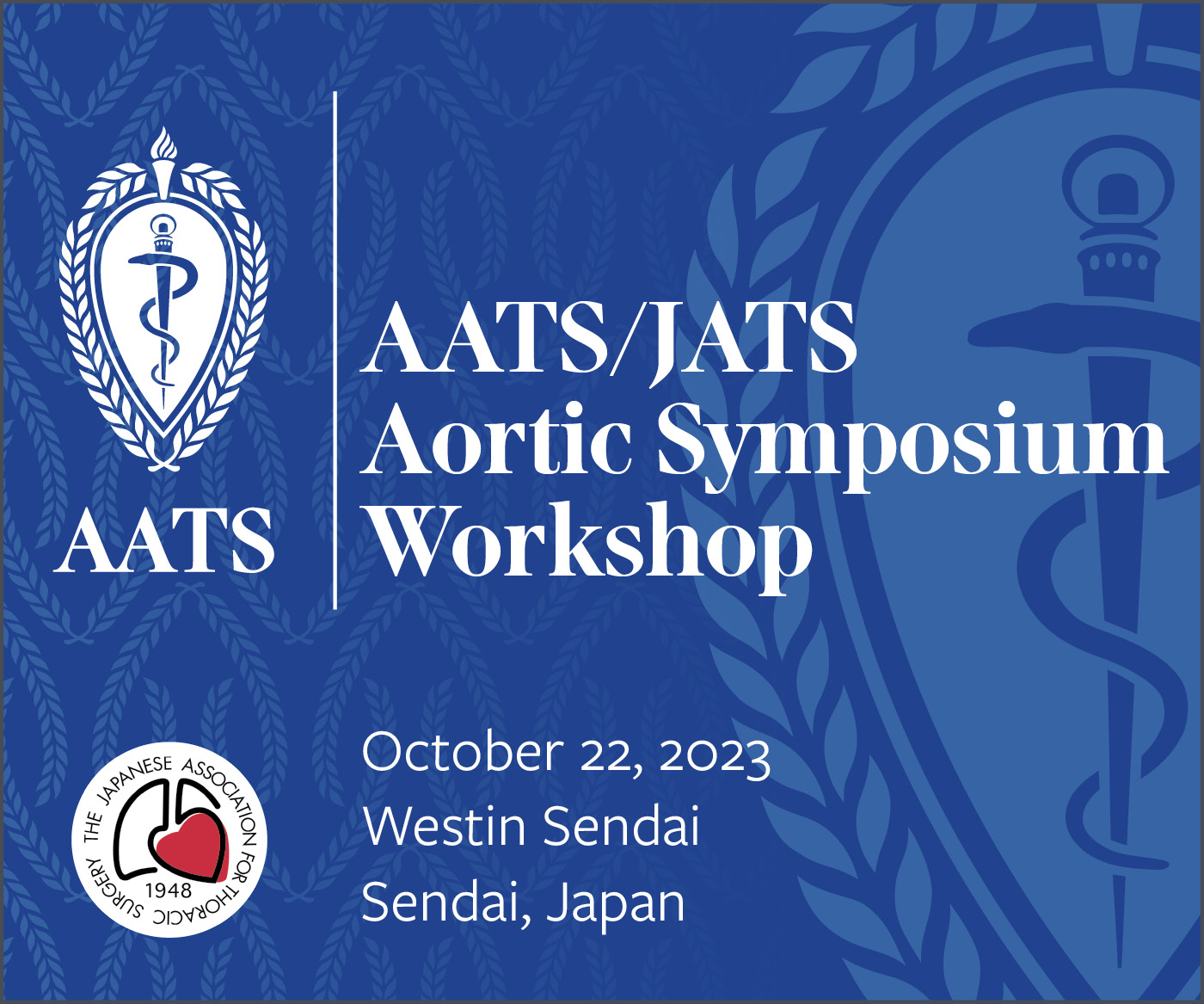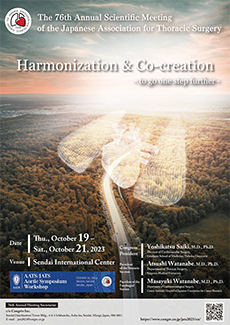Call for abstracts
Call for abstracts
Application Period: from noon on February 15, 2023
to noon on April 19, 2023 (JST/GMT+9)
to noon on May 9, 2023(JST/GMT+9)
Thank you for your submission!
Abstract Submission is closed.
Foreign presenters and Co-speakers do not have to be members of the Japanese Association for Thoracic Surgery (JATS)
*For those who are interested in becoming JATS members, please contact the Japanese Association for Thoracic Surgery:
1F Teral Koraku Building, 2-3-27 Koraku, Bunkyo-ku, Tokyo 112-0004, JAPAN
Phone: +81-3-3812-4253 Fax: +81-3-3816-4560
URL: http://www.jpats.org/ E-mail: jats-adm@umin.ac.jp
If you are interested in submitting an abstract for a Primary Session,
please click on the Guideline button below for details and check if you are eligible for the 7th JATS Asian Travelling Fellowship!
Click here! ↓
The 7th JATS Asian Travelling Fellowship Application Guidelines Application Form1.Presentations must be of original material and being presented for the first time.
2.Once presentations are approved by the Program Committee, Copyright of the presentations will be assumed by the Japanese Association for Thoracic Surgery.
3.Application procedure
1- Application period
Opens at noon on February 15, 2023 (JST/GMT+9)
Closes at noon on April 19, 2023 (JST/GMT+9)
2- Submissions
1. Recommended Browsers
To use the online abstract submission system, please use the latest version of Firefox, Google Chrome, Microsoft Edge or Safari.
*Internet Explorer (IE) or any other browsers are non-compliant browsers for the online abstract submission system.
2. Abstract Submission Number and Password
During the course of entering your information, you will be required to set your own password.
Upon completion of the abstract submission process, you will be given your abstract submission number. Your abstract submission number and password are very important, so please keep them safe and confidential.
We, the Program Secretariat, will use the abstract submission number when contacting you.
Please note, we will not respond to inquiries regarding security issues. Your abstract submission number and password may be used to login and modify your abstract and information up until the submission deadline (at noon on April 19, 2023, JST/GMT+9).
3. Abstract Specifications
Language: English
Abstract Title: Limited to 200 characters
Abstract Text: Limited to 2,000 characters
Figures and Tables: A single GIF or JPEG file no larger than 300KB
(portrait or landscape accepted; size will be reduced to approximately 6*4 cm).
4. Confirmation of Submission
After submitting your abstract, you will receive a confirmation e-mail. You may use the submission link to view and modify your abstract at any time up until the abstract submission deadline.
If you do not receive confirmation by e-mail, please contact the Program Secretariat:
jats2023-prog@congre.co.jp
5. Notification of Acceptance
The Program committee will carefully review all submitted abstracts, consider the reviews, and then make a final decision on which papers to select.
The first author will receive a notification of acceptance via email by the end of July.
The paper selection results will also be listed on the congress website.
Following the notification of acceptance, the first author must register for the 76th Annual Meeting, and abstracts can only be presented upon receipt of the registration fee.
6. Video Submission
For those presenting in Video Symposiums, Video Workshops, Video Clinics, and Clinical Video Sessions, please place a check mark “✔” under the “video” when submitting your abstract.
Once completing the abstract submission process, please return to the “Call for Abstracts” page to upload your video for review. Click on the “Upload Video” button to the appropriate session type to complete the video upload process. In this process, you are required to enter your “Abstract submission number”, so please retain your number.
Video Submission
Modify and Delete
●Primary Session
E. Esophagus
06_Video Symposium
Feasibility and safety of minimally invasive approach for locally advanced cT3br or cT4 esophageal cancer
- Clinical Question/Outline
-
CQ1:Can MIE be performed safely in patients with locally advanced esophageal cancer?
CQ2:Is MIE feasible in curability as compared with open esophagectomy?
Outline:
Open surgery has been the standard approach for esophagectomy for patients with cT3br or T4 locally advanced esophageal cancer after neoadjuvant or induction therapy. Recently, minimally invasive esophagectomy (MIE) became an alternative approach for such cases in some institutes. However, it remains unclear if MIE can be performed safely, whether a plan for conversion to open surgery is required, and whether MIE guarantees curability equivalent to open surgery. In this video symposium, please discuss the feasibility and efficacy of MIE for locally advanced esophageal cancer compared with open surgery.
●Oral/Poster Presentation, Clinical Video Session
- T. Cross-disciplinary
- H. Heart
- L. Lung
- E. Esophagus
| 01 | T-1 | Cross-disciplinary/Combined cardiothoracic surgery (heart/aorta+α) |
|---|---|---|
| 02 | T-2 | Cross-disciplinary/Combined cardiothoracic surgery (lung+α) |
| 03 | T-3 | Cross-disciplinary/Combined cardiothoracic surgery (esophagus+α) |
| 04 | H-1 | Heart/Valvular disease-aortic |
|---|---|---|
| 05 | H-2 | Heart/Valvular disease-mitral |
| 06 | H-3 | Heart/Valvular disease-tricuspid |
| 07 | H-4 | Heart/Valvular disease-pulmonary |
| 08 | H-5 | Heart/Valvular disease-combined |
| 09 | H-6 | Heart/Valvular disease-MICS/Robotics |
| 10 | H-7 | Heart/Valvular disease-TAVI/MitraClip |
| 11 | H-8 | Heart/Valvular disease-infective endocarditis |
| 12 | H-9 | Heart/Valvular disease-others |
| 13 | H-10 | Heart/Ischemic heart disease-CABG |
| 14 | H-11 | Heart/Ischemic heart disease-minimally invasive CABG |
| 15 | H-12 | Heart/Ischemic heart disease-complications of myocardial infarction |
| 16 | H-13 | Heart/Ischemic heart disease-others |
| 17 | H-14 | Heart/Aorta-type A dissection |
| 18 | H-15 | Heart/Aorta-type B dissection |
| 19 | H-16 | Heart/Aorta-complications of aortic dissection |
| 20 | H-17 | Heart/Aorta-aortic root |
| 21 | H-18 | Heart/Aorta-ascending/arch |
| 22 | H-19 | Heart/Aorta-descending |
| 23 | H-20 | Heart/Aorta-thoracoabdominal |
| 24 | H-21 | Heart/Aorta-esophageal/bronchial fistula |
| 25 | H-22 | Heart/Aorta-infected aneurysm/graft infection |
| 26 | H-23 | Heart/Aorta-others |
| 27 | H-24 | Heart/Combined surgery (valve, coronary, aorta, etc.) |
| 28 | H-25 | Heart/Arrhythmia/pacemaker |
| 29 | H-26 | Heart/Maze surgery |
| 30 | H-27 | Heart/Closure/resection of LAA |
| 31 | H-28 | Heart/Acyanotic congenital heart disease |
| 32 | H-29 | Heart/Aortic arch anomaly/coarctation of aorta |
| 33 | H-30 | Heart/Hypoplastic left heart syndrome: HLHS |
| 34 | H-31 | Heart/Transposition of great arteries |
| 35 | H-32 | Heart/Miscellaneous cyanotic diseases |
| 36 | H-33 | Heart/Long-term issues/complications |
| 37 | H-34 | Heart/Adult congenital heart disease |
| 38 | H-35 | Heart/Cardiac tumor |
| 39 | H-36 | Heart/Cardiomyopathy/myocarditis |
| 40 | H-37 | Heart/Heart・heart-lung transplantation |
| 41 | H-38 | Heart/Myocardial protection and metabolism |
| 42 | H-39 | Heart/Extracorporeal circulation |
| 43 | H-40 | Heart/Mechanical circulatory support/ventricular assisted system |
| 44 | H-41 | Heart/Pulmonary circulation(CTEPH) |
| 45 | H-42 | Heart/Perioperative management and complications |
| 46 | H-43 | Heart/Examination and diagnosis |
| 47 | H-44 | Heart/Experiment |
| 48 | H-45 | Heart/New surgical techniques |
| 49 | H-46 | Heart/Development and innovation |
| 50 | H-47 | Heart/Regenerative medicine and tissue engineering |
| 51 | H-48 | Heart/Others |
| 52 | L-1 | Lung/Lung cancer |
|---|---|---|
| 53 | L-2 | Lung/Pulmonary metastasis |
| 54 | L-3 | Lung/Mediastinum (thymic disease) |
| 55 | L-4 | Lung/Mediastinum (non-thymic disease) |
| 56 | L-5 | Lung/Pleura, chest wall, and thorax |
| 57 | L-6 | Lung/Trachea and bronchus |
| 58 | L-7 | Lung/Pneumothorax and emphysematous/bullous lung disease |
| 59 | L-8 | Lung/Inflammatory lung diseases |
| 60 | L-9 | Lung/Benign lung tumor |
| 61 | L-10 | Lung/Pediatric lung disease |
| 62 | L-11 | Lung/Minimally invasive surgery (Video-assisted and Robot-assisted thoracic surgery, VATS and RATS) |
| 63 | L-12 | Lung/Salvage surgery |
| 64 | L-13 | Lung/Lung transplantation and assisted circulation |
| 65 | L-14 | Lung/New surgical techniques |
| 66 | L-15 | Lung/Perioperative management and complications |
| 67 | L-16 | Lung/Examination and diagnosis |
| 68 | L-17 | Lung/Gene and molecular biology |
| 69 | L-18 | Lung/Regenerative medicine |
| 70 | L-19 | Lung/Others |
| 71 | E-1 | Esophagus/Esophageal malignancies |
|---|---|---|
| 72 | E-2 | Esophagus/Esophageal benign diseases |
| 73 | E-3 | Esophagus/Barrett's esophagus and adenocarcinoma |
| 74 | E-4 | Esophagus/Esophagectomy and lymphadenectomy |
| 75 | E-5 | Esophagus/Esophageal reconstruction |
| 76 | E-6 | Esophagus/Minimally invasive and robotic-assisted surgery |
| 77 | E-7 | Esophagus/Treatment for recurrent esophageal cancer |
| 78 | E-8 | Esophagus/Aortoesophageal fistula |
| 79 | E-9 | Esophagus/Genetics and molecular biology |
| 80 | E-10 | Esophagus/Pathology and experimental research |
| 81 | E-11 | Esophagus/Perioperative management and complications |
| 82 | E-12 | Esophagus/Multidisciplinary treatment |
| 83 | E-13 | Esophagus/Palliative treatment |
| 84 | E-14 | Esophagus/Esophageal cancer in elderly |
| 85 | E-15 | Esophagus/Others |
7- Presentation format
Information about presentation format and methodology requirements will be released in due course. These requirements are subject to change. Applicants are advised to check the website for the latest information.
Abstract Submission
【ciphertext-based】(recommended)
Abstract Submission
Confirm, Modify and Delete
【plaintext-based】
Abstract Submission
Confirm, Modify and Delete
Inquiries
Secretariat of the 76th Annual Scientific Meeting of the Japanese Association for Thoracic Surgery c/o Congrès Inc.
E-mail: jats2023-prog@congre.co.jp




